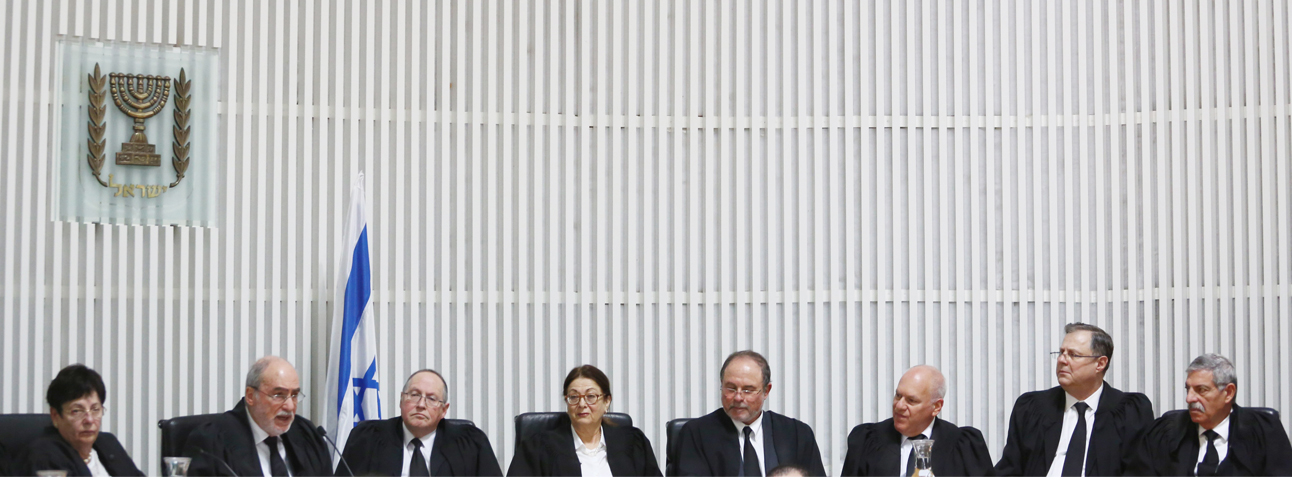Why is Public Trust in the Supreme Court Falling?
In an age of waning trust in state institutions and an ongoing health and democratic crisis, the public must be able to look towards the courts as a staunch defender of human rights and democratic structure.

Flash 90
Like all State institutions studied and analyzed by the Israeli Democracy Index survey over 2020, the Supreme Court also experienced a decline in public trust. This is no surprise, given the ongoing governmental crisis in Israel. But some surprise appears if we dig deeper into the data because in contrast with previous years, the drop in trust can be attributed to what is happening on the Left. In fact, between June and October 2020, the decline in public trust on the Left (of around15 points) was double that that on the Right.
The concern is that this drop stems not only from the overall (and expected) decline in public trust in all State institutions, but rather–reflects a disappointment in the way in which the Court performed its democratic functions over the past year.
This kind of troubling trend has happened before on the Right. Between 2005 and 2008, following Israel’s withdrawal from Gaza ("Israeli disengagement program"), the trust of right-wing voters in the Supreme Court plummeted, with many of them viewing the court as an institution that had done nothing to protect the rights of the settlers evacuated from Gush Katif. This marked a turning point for many on the Right, who—as a result-- then decided to lead a transformation that would change the face of the Supreme Court. The following decade saw the effects of the Right’s “disengagement from the Supreme Court”, after it came to understand the Court’s crucial role in the struggle to shape the character of the State of Israel, and particularly-- for shifting the balance between its liberal and nationalist values. This change began with a declining trust, and then, after the political consolidation of Right-Wing coalitions, public and political attacks on the scope of the Court’s powers, followed by explicit attempts to change its make-up and character. The Court has faced constant attempts to weaken it and limit its powers ever since, and the legitimate debate over its judgments turned in to a populist bashing of its mere legitimacy.
These attacks have led the Supreme Court to introduce more conservative and national values, and to dial back on its role in defending democracy. Today, in various contexts, we can see the importance attributed by the judges to emphasizing a policy of deference and conservatism. In the past year, for example, we can note the landmark judgments on indicted Prime Minister Netanyahu’s right to assemble a coalition after getting the mandate, which was all about presenting deference, a conservative rhetoric of restraint and even political constitutionalism, emphasizing the sovereignty of the Knesset. Likewise, the justices’ comments in the hearings on the landmark petitions against the Jewish Nation-State Basic Law were of a similar nature. Throughout the course of the coronavirus pandemic—and despite the Court’s important procedural role in the judgments surrounding Speaker of the Knesset Yuli Edelstein—we would be hard-pressed to say that the court was exceptionally activist in defending human rights and freedoms. Even its recent rulings and hearings on the right to demonstrate, came only after the imposition of unprecedented political restrictions on this right.
The data from the 2020 Israeli Democracy Index should be of concern to the Supreme Court, not only because it has tried hard to strengthen its conservative image, but especially because the loss of trust is most marked among the more liberal segment of the population. Is this the result the Court was after? This seems unlikely.
The deeper concern in this context, is of a “reverse disengagement effect”, that is, a creeping erosion of public trust on the Left, and subsequently-- among Israel’s Center-Left voters. Although the center-left in Israel is not as politically consolidated as the right, the vast majority of its fractions attach immense importance to the democratic role of the court. and needless to say, the liberal values entrusted to the Supreme Court are not the exclusive property of the political Left. A trend of waning public trust on the Left or among the Arab public, is no less dangerous than the similar trend on the Right. If this measurement signals disappointment with how the court has fulfilled its role with regard to protecting democracy, and particularly, with how it has defended rights and freedoms, continued attempts to project a more conservative image could pose a real risk to its institutional capacity.
In an age of waning trust in State institutions and an ongoing health and democratic crisis, the public must be able to look towards the courts as a staunch defender of human rights and democratic structure. In Israel, the Supreme Court must be wary of even the first signs of a trend of loss of trust. Public disappointment with the fall of the democratic bastion is just as dangerous as a Public disappointment with expansion of its powers.
The article was published in the Jerusalem Report/Post.
